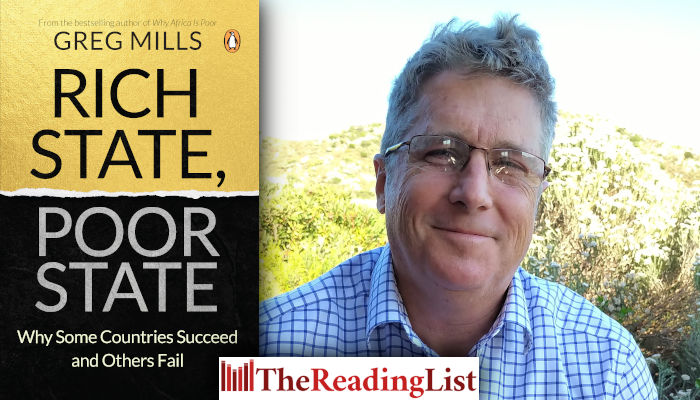Why politics matters to prosperity – Greg Mills examines why some countries succeed while others fail in Rich State, Poor State
More about the book!

Africans are half as wealthy today compared to their global peers than they were at independence. There is a persistent default to economic crisis, and the appetite to carry out reforms never matches the rhetoric, says Dr Greg Mills. The reason Africa fails is … politics.
‘Four times more South African citizens were killed in violent crime in 2022 than civilians who died in the war in Ukraine.’
Politics is where elites compete for power (or hold onto it) and the protection and extraction of rents and preferences. In Africa this occurs in systems where the clientelist political economy ensures the persistence of policies that address short-term popular needs over long-term reforms necessary for economic development.
Elites continue to follow this path since they can get away with it – most of the time, at least – by employing combinations of identity politics and populism, and using external support to barricade their power. They get away with it because they are allowed to by people trapped in a system of government that deliberately emasculates and undermines the impact of their vote.
Politics seeps into the fabric and operations of institutions too. Bureaucracies become less a check and balance on executive power than a roadblock to getting things done, at risk of operating in narrow personal and vested interests, subject to incompetencies and job insecurities.
This helps to explain why the cost of Africa’s lost economic ground is so vast – and the upside of getting things right, or at least better, encouragingly positive.
The answer appears to lie not in the technocratic details of reform – since these are comparatively easy to identify and specify – but rather in the choices that leaders and their political networks make.
There is no fixed reason why countries should not reform and recover, even though circumstances – from climate to geography – can make this more difficult. More important is the manner in which governments seek to make changes – their ability to plan, prioritise, and implement; ultimately, the way in which leaders back their people.
Good leaders armed with strategic nous and moral integrity can make a difference.
While some countries – including the Baltics to Mauritius, Singapore, Vietnam and Botswana – have refused to be dragged down by their history, others have become prisoners of their past.
Around the same time that the Baltics threw off the yoke of fascist Soviet rule, South Africa underwent its own negotiated transition to freedom, from apartheid to democracy. But whereas the Baltics transitioned quickly from a state-centric to a liberal system, South Africa headed in the opposite direction, replacing one racial oligarchy with another, with the state at the centre as the means of redistribution. Aside from making a few (often politically connected) entrepreneurs exceedingly rich, further down the income totem this was effected through civil service jobs and, at the bottom, through welfare payments.
But this was never going to be enough, in at least two respects: the first in terms of the money that could be redistributed to meet expectations; and the second in terms of the corrosive effect on the state itself.
The result was the ‘state capture’ period suffered under President Jacob Zuma who took office in 2009, which removed (or simply ignored) governance strictures in handing out contracts, a process that cost the country an estimated R500 billion ($30 billion), or 25 per cent of its annual budget. Institutional erosion and then failure led to a loss of confidence in (and respect for) the state, compounding the effect. The outcomes can be seen in a collapse of basic service delivery, the poor performance of municipalities, the problems experienced in electricity and water delivery, low levels of growth and investment and a corresponding increase in unemployment, and, most starkly, a radical increase in crime, especially violent crime.
Four times more South African citizens were killed in violent crime in 2022 than civilians who died in the war in Ukraine.
How the country’s citizens might turn this situation around without a change from the political party that got South Africa into this state is at best aspirational if its leaders are unwilling to recognise their role and responsibility. While some might prefer the idea of a ‘Big Man’ to get things done, there are dangers in the temptation of authoritarianism, or of New Wave Populism.
Hope exists in a range of examples which have turned around apparently hopeless situations, far more dire than those faced by South Africans.
Politics centres on the agency of sometimes agonisingly difficult choices, and often the inertia of the grave can overcome the desire for reform. Change is possible, and can have a tremendously positive effect, witness the impact of liberalisation in the telecom sector. But when state operating systems are soaked in such methods, changing them is hard and requires tough-minded leadership with a plan and a mandate to carry out reforms.
Good examples of change can also help.
Rich State, Poor State is out now.
~~~
This article was originally published in The Penguin Post, a magazine about books for book lovers from Penguin Random House South Africa.
Categories Non-fiction South Africa
Tags Greg Mills Penguin Random House SA Rich State Poor State The Penguin Post
